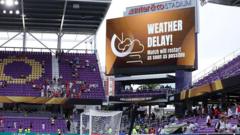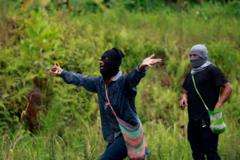Is Weather Disrupting the Club World Cup?

The Impact of Weather on the FIFA Club World Cup: A Comprehensive Overview
The FIFA Club World Cup has always been a stage for showcasing the world’s top football clubs, but this year, weather conditions have taken center stage. The tournament has faced significant delays due to thunderstorms and heatwaves, affecting player performance, fan experience, and broadcasting schedules. With the next World Cup just around the corner, understanding these weather-related challenges is crucial for the future of the sport. This article will delve into the recent weather disruptions, their implications, and what FIFA is doing to mitigate these challenges.
Thunderstorms Disrupt Matches
In a surprising turn of events, the half-time break during Benfica's match against Auckland City extended to a staggering two-and-a-half hours due to heavy rain and thunderstorms in Orlando. This was not an isolated incident; it was part of a troubling pattern during the tournament. For instance, the kick-off for Mamelodi Sundowns versus Ulsan HD was delayed by over an hour, while other matches also experienced significant interruptions:
- Palmeiras vs. Al-Ahly: 40-minute delay
- Salzburg vs. Pachuca: 90-minute delay
With four games already impacted by severe weather, organizers and teams are grappling with the reality of unpredictable conditions. The situation raises questions about preparedness and the efficacy of existing protocols for weather management during major sporting events.
Heatwave Concerns: A Rising Threat
As if thunderstorms weren't enough, a heatwave is expected to complicate matters further, particularly as temperatures are projected to soar to 41°C (about 106°F) in various venues. The campaign group Fossil Free Football has expressed serious concerns about the safety of players and fans. They highlighted that ten matches are scheduled in the coming week under conditions categorized as either major or extreme heat risk.
Health Risks for Players and Fans
Excessive heat poses a multitude of risks, including:
- Heat exhaustion
- Dehydration
- Heatstroke
- Decreased performance levels
Players from teams like Paris Saint-Germain and Atletico Madrid have voiced their struggles with the extreme temperatures. After a match in Pasadena, Marcos Llorente of Atletico Madrid described the conditions as "terribly hot," illustrating the physical toll such heat can take on athletes.
FIFA's Response to Weather Challenges
In light of these challenges, FIFA has stated that they are committed to monitoring weather conditions closely in collaboration with venue teams. Their primary focus is to ensure the health and safety of everyone involved in the tournament. They have implemented several measures to manage the heat:
- Cooling breaks during matches at the 30th and 75th minute intervals, if needed.
- Allowing fans to bring empty clear bottles of up to one liter into stadiums for hydration.
Although these measures are a step in the right direction, the effectiveness of such interventions remains to be seen, especially with the forecasted extreme heat in the coming days.
Implications for Scheduling and Broadcasting
The delays caused by weather not only affect player performance but also present logistical problems for match scheduling and broadcasting. Four of the first 21 games experienced delays ranging from 40 minutes to two-and-a-half hours. This creates a potential scheduling nightmare, particularly for broadcasters who are concerned about overlapping matches during the 2026 World Cup.
For instance, Benfica's match against Auckland City was supposed to end an hour before Chelsea's game against Flamengo started. However, due to the extended delay, the conclusion of Benfica’s game came after Chelsea's match had already begun. Such overlaps can lead to significant disruptions for viewers and broadcasters alike.
Future Considerations: The 2026 World Cup
With the next World Cup set to take place in 2026, co-hosted by the United States, Canada, and Mexico, the lessons learned from the current challenges must be taken seriously. Organizers must consider the following:
- Enhancing infrastructure to deal with weather-related interruptions.
- Implementing more robust protocols for heat management.
- Providing adequate shelter and hydration stations for fans.
FIFA has acknowledged these concerns and promises to continue evaluating their strategies to ensure a safe and enjoyable experience for players and fans alike.
Conclusion: The Need for Adaptability in Football
The ongoing weather challenges during the FIFA Club World Cup highlight the need for adaptability in sports. As climate change continues to affect weather patterns globally, sporting organizations must prioritize the health and safety of all involved. The recent incidents serve as a wake-up call for FIFA and other governing bodies to take decisive action to safeguard the future of football.
As we look ahead to the 2026 World Cup, it will be interesting to see how these lessons are implemented and whether adequate measures are taken to ensure that both players and fans can enjoy the beautiful game without the looming threat of adverse weather conditions. Will FIFA rise to the occasion and prioritize the safety of all participants? Only time will tell.
FAQs
What are the health risks associated with extreme heat during football matches?
Extreme heat can lead to several health issues, including heat exhaustion, dehydration, heatstroke, and a decrease in athletic performance.
How is FIFA addressing weather-related concerns for players and fans?
FIFA has implemented cooling breaks during matches and allows fans to bring empty water bottles into stadiums to stay hydrated.
What impact do weather delays have on match scheduling for major tournaments?
Weather delays can cause significant disruptions, leading to overlapping matches and complications for broadcasters and fans.
As this year's FIFA Club World Cup progresses, it is clear that addressing weather-related challenges is essential for the future of the sport. Will FIFA adopt more proactive measures to ensure the safety of players and fans alike? #FIFAWorldCup #WeatherChallenges #FootballSafety
Published: 2025-06-20 21:32:13 | Category: sport



